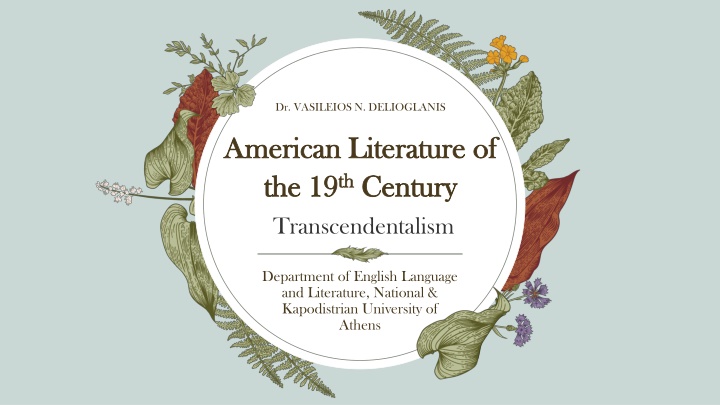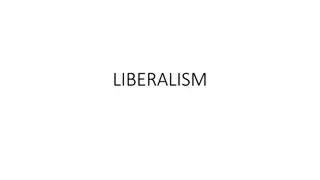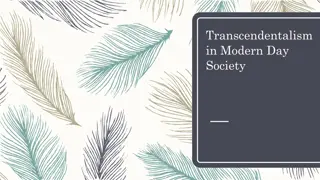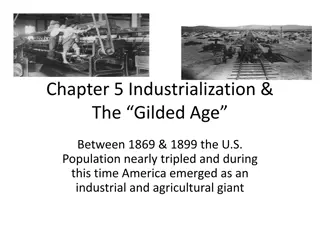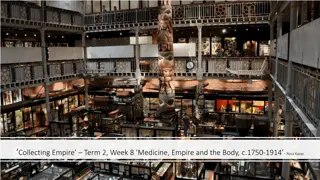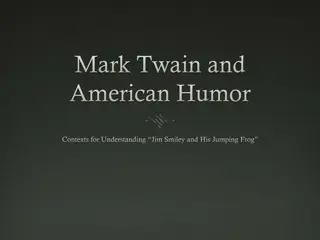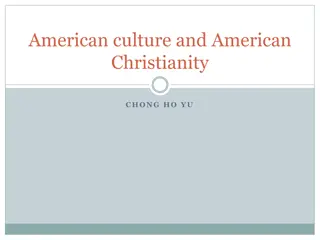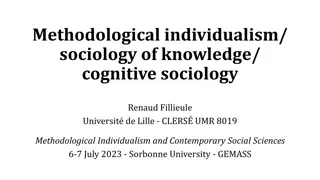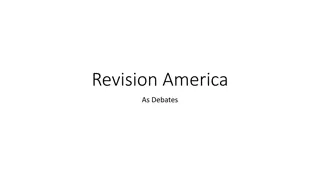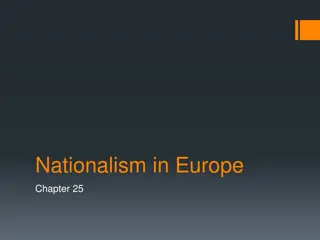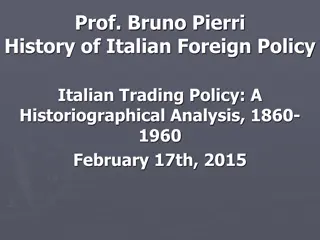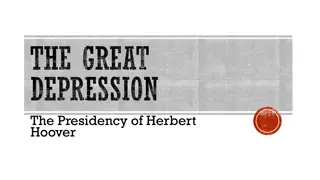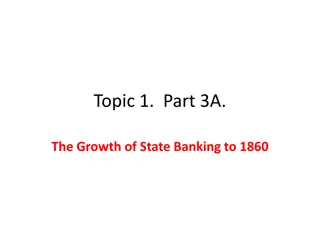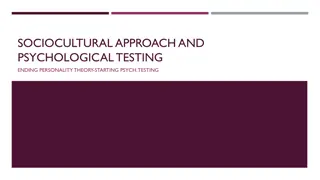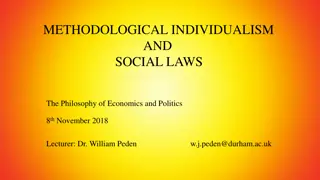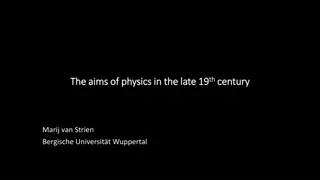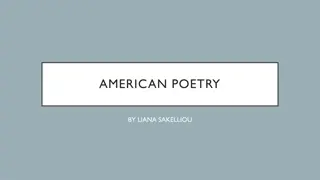Transcendentalism and American Individualism in the 19th Century
Explore the essence of Transcendentalism through the works of Ralph Waldo Emerson and Henry David Thoreau, focusing on self-reliance, spiritual vision, and resistance to societal norms. Delve into their philosophical perspectives on the unity of the world, individualism, and the pursuit of a higher law beyond civil government.
Download Presentation

Please find below an Image/Link to download the presentation.
The content on the website is provided AS IS for your information and personal use only. It may not be sold, licensed, or shared on other websites without obtaining consent from the author.If you encounter any issues during the download, it is possible that the publisher has removed the file from their server.
You are allowed to download the files provided on this website for personal or commercial use, subject to the condition that they are used lawfully. All files are the property of their respective owners.
The content on the website is provided AS IS for your information and personal use only. It may not be sold, licensed, or shared on other websites without obtaining consent from the author.
E N D
Presentation Transcript
Dr. VASILEIOS N. DELIOGLANIS American Literature of American Literature of the 19 the 19th thCentury Century Transcendentalism Department of English Language and Literature, National & Kapodistrian University of Athens
Unity of the World and God Self-Reliance, self-realization, self- expression Individualism Individual soul = God = World Self and nature Transcendentalism Value of History Making Sense of the Universe Alternative to American materialism Menace to organized religion Concord: New England village
Ralph Waldo Emerson (1803-1882)
Ralph Waldo Emerson (1803-1882) religious sense of mission Was accused of subverting Christianity he accused the church of acting as if God were dead birth of American individualism inspired by nature the need for a new national vision use of personal experience cosmic Over-Soul Spiritual vision and practical, aphoristic expression his spiritual insight comes from his readings in Eastern religion
Brahma (1856) He treats shame and fame at the same level. the Hindu god of creation, one of the gods in Trinity (Consisting of Brahma, Vishnu and Mahesh) The vanquished gods also appear to Him. He resides in Heaven. the ultimate soul of the universe He can t be doubted because He Himself is doubter and doubt A slayer and the slain are also the result of the same spirit. timeless, immortal and permanent Can t be destroyed Omnipresent If anything is far or forgotten, that thing is very close to Brahma Nothing is secret to Him Shadow and sunlight are the same for Him.
Henry David Thoreau (1817-1862)
Henry David Thoreau Resistance to Civil Government (1849) Main Themes Main Themes Civil Government vs. Higher Law Government vs. an Individual Materialism vs. Simple Life Presentation title
Henry David Thoreau Resistance to Civil Government (1849) Civil Civil Government Government v vs. s. Higher Higher Law Law Thus the State never intentionally confronts a man s sense, intellectual or moral, but only his body, his senses. It is not armed with superior wit or honesty, but with superior physical strength. I was not born to be forced. I will breathe after my own fashion. Let us see who is the strongest. What force has a multitude? They only can force me who obey a higher law than I. They force me to become like themselves. I do not hear of men being forced to live this way or that by masses of men. (563) But a government in which the majority rule in all cases cannot be based on justice, even as far as men understand it (954)
Henry David Thoreau Resistance to Civil Government (1849) Civil Civil Government Government v vs. s. Higher Higher Law Law It is not a man s duty, as a matter of course, to devote himself to the eradication of any, even the most enormous wrong; he may still properly have other concerns to engage him; but it is his duty, at least, to wash his hands of it, and, if he gives it no thought longer, not to give it practically his support. If I devote myself to other pursuits and contemplations, I must first see, at least, that I do not pursue them sitting upon another man's shoulders. I must get off him first, that he may pursue his contemplations too. (957) "I have other affairs to attend to. I came into this world, not chiefly to make this a good place to live in, but to live in it, be it good or bad." (959) . . . the government does not concern me much, and I shall bestow the fewest possible thoughts on it. It is not many moments that I live under a government, even in this world. If a man is thought-free [free in his thinking], fancy-free, imagination-free, that which is not never for a long time appearing to be to him, unwise rulers or reformers cannot fatally interrupt him. (966)
Henry David Thoreau Resistance to Civil Government (1849) Government Government v vs s. . Individual Individual Government as an expedient by which men would fain succeed in letting one another alone. "But it is not the less necessary for [its shortcomings]; for the people must have some complicated machinery or other . . . to satisfy that idea of government which they have. (953-954) But, to speak practically and as a citizen, unlike those who call themselves no- government men, I ask for, not at once no government, but at once a better government. Let every man make known what kind of government would command his respect, and that will be one step toward obtaining it. (954) a government in which the majority rule in all cases cannot be based on justice, even as far as men understand it. Can there not be a government in which majorities do not virtually decide right and wrong, but conscience? in which majorities decide only those questions to which the rule of expediency is applicable? Must the citizen ever for a moment, or in the least degree, resign his conscience to the legislator? (954)
Henry David Thoreau Resistance to Civil Government (1849) Government Government v vs s. . Individual Individual It has not the vitality and force of a single living man. . . . (953) Some are petitioning the State to dissolve the Union, to disregard the requisitions of the President. Why do they not dissolve it themselves, the union between themselves and the State, and refuse to pay their quota into its treasury? Do they not stand in the same relation to the State, that the State does to the Union? And have not the same reasons prevented the State from resisting the Union, which have prevented them from resisting the State? (958) If a thousand men were not to pay their tax- bills this year, that would not be a violent and bloody mea sure, as it would be to pay them, and enable the State to commit violence and shed innocent blood. This is, in fact, the definition of a peaceable revolution, if any such is possible. (960)
Henry David Thoreau Resistance to Civil Government (1849) Government Government v vs s. . Individual Individual In fact, I quietly declare war with the State, after my fashion, though I will still make what use and get what advantage of her I can, as is usual in such cases. (965) There will never be a really free and enlightened State, until the State comes to recognize the individual as a higher and independent power, from which all its own power and authority are derived, and treats him accordingly. I please myself with imagining a State at last which can afford to be just to all men, and to treat the individual with respect as a neighbor. . . . A State which bore this fruit . . . would prepare the way for a still more perfect and glorious State, which also I have imagined, but not yet anywhere seen. (968)
Henry David Thoreau Resistance to Civil Government (1849) Materialism Materialism v vs s. . Simple Simple Life Life I have contemplated the imprisonment of the offender, rather than the seizure of his goods, though both will serve the same purpose, because they who assert the purest right, and consequently are most dangerous to a corrupt State, commonly have not spent much time in accumulating property. (961) But the rich man not to make any invidious comparison is always sold to the institution which makes him rich. Absolutely speaking, the more money, the less virtue; for money comes between a man and his objects, and obtains them for him; and it was certainly no great virtue to obtain it. (961) Thus his moral ground is taken from under his feet. (961) But, if I deny the authority of the State when it presents its taxbill, it will soon take and waste all my property, and so harass me and my children without end. This is hard. This makes it impossible for a man to live honestly and at the same time comfortably in outward respects. It will not be worth the while to accumulate property; that would be sure to go again. You must hire or squat somewhere, and raise but a small crop, and eat that soon. You must live within yourself, and depend upon yourself, always tucked up and ready for a start, and not have many affairs. (962)
